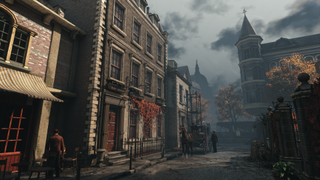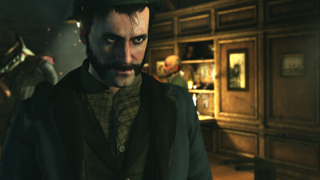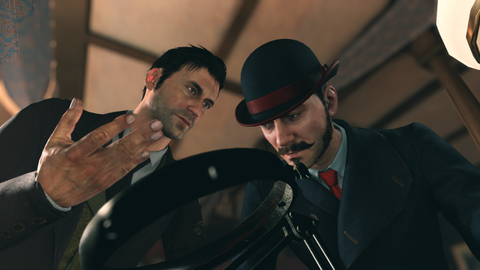Our Verdict
An increased focus on action and unsatisfying cases overshadow the decent bits in this detective adventure.
PC Gamer's got your back
What is it? A crime adventure starring the famous detective.
Expect to pay £30/$50
Developer Frogwares
Publisher Bigben Interactive
Reviewed on GeForce GTX 970, Intel i7-950, 16GB RAM
Multiplayer None
Link Official Site
If you’ve played any of Frogwares’ other Sherlock adventures, the first thing you’ll notice in The Devil’s Daughter is how Holmes and Watson have changed. Sherlock now looks so much like Mad Men actor Jon Hamm that it has to be intentional, and his faithful colleague’s curiously sculpted facial hair makes him looks like Jude Law at a steampunk convention.
It’s feels like they’ve tried to make the duo look younger and cooler to broaden the appeal of the game, but it just doesn’t fit the characters. Sherlock is far too rugged and handsome, and Watson doesn’t feel like the same person without his bowler hat and moustache. Change is good, and characters can be reinvented, but these new designs almost feel like they betray the characters.
The game is supposedly a prequel, explaining their more youthful appearance. But if that’s the case, why do supporting characters like Mrs. Hudson and Inspector Lestrade look exactly the same?

The previous entry in the series, Crimes and Punishments, was superb. A smart, atmospheric crime adventure, and one of the best detective games on PC. The only thing I didn’t like were the clumsy action sequences and mini-games, and I was disappointed to discover that there are even more of them in The Devil’s Daughter.
The story begins in media res with an injured Sherlock running through a snow-covered forest being shot at by an unseen figure. Then we jump back in time to Baker Street as a tearful boy asks him to find his missing father. Immediately you can tell Frogwares are trying to be more cinematic with this game. Some may prefer this, but for me Sherlock is supposed to be cerebral and slow-paced, not an action movie.
The detecting itself hasn’t changed much. You poke around a series of impressively detailed environments for clues. Then you leap inside Sherlock’s mind and piece what you’ve gathered together. And it’s entirely possible to jump to the wrong conclusion and accuse the wrong person if you haven’t found all the evidence. This is the game’s greatest strength, giving you some genuine agency over how the case unfolds.
I also love that you can choose if you want to find out whether you accused the right person or not. At the end of the case you can press a button to reveal the truth, and are given the option to retry if not.
But then, inevitably, you’re dragged away from being a detective to take part in some clumsy, awkward set-piece or mini-game. One minute you’ll be stalking a suspect as a sooty-faced street urchin, the next you’ll be playing an achingly slow game of lawn bowls.
And the chase through the forest I mentioned earlier is a maddening slog that never seems to end. You lurch from tree to tree, taking cover from a pursuing gunman, using your detective vision to pick a path through a swamp. These scenes are almost entirely boring, frustrating, and badly designed.
You can skip them if you want, which makes me wonder if even the developers knew they were a bit shit. And even then, bypassing them only solves one problem.

Another is that the cases aren’t particularly compelling or well-constructed, especially compared to Crimes and Punishments. Many of the conclusions are abrupt and unsatisfying, and the game’s occasional foray into the supernatural feels hokey and out of place.
In most cases key areas are linked by a limited open-world of sorts. You’re free to wander the cobbled streets of Victorian London, and it’s clear a lot of effort has gone into its construction. There are some nice details here, like an under construction Tower Bridge.
But all it’s really used for is the occasional environmental puzzle where you locate someone’s house with their street name and number. It’s ultimately an unnecessary addition, and I wish they’d used those resources to tighten up and polish the other parts of the game.
There are glimmers of earlier Sherlock games here, with a couple of cases that almost—but not quite—reach the heights of Crimes and Punishments. But overall it’s an inferior sequel that relies too heavily on scripted set-pieces, QTEs, and mini-games. I really wanted to like The Devil’s Daughter, hoping the developers would build on the many things the last game did well, but it’s actually a step backwards in many ways.










An increased focus on action and unsatisfying cases overshadow the decent bits in this detective adventure.
If it’s set in space, Andy will probably write about it. He loves sci-fi, adventure games, taking screenshots, Twin Peaks, weird sims, Alien: Isolation, and anything with a good story.

